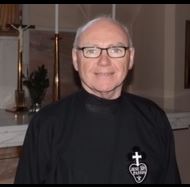This week I have been preparing some materials for the month of November, our special time of remembering our loved ones who have died, and it prompted a particular memory. For 10 years I was the secretary to the North European Conference of the Passionists. We have since done some restructuring, but the Passionist Provinces in the Conference at that time were Ireland/Scotland; England/Wales; Netherlands; Belgium; Germany; France and Poland. There was an annual meeting of the leaders of the provinces that usually lasted 3 or 4 days. The meetings moved around the various locations and, especially with the language differences, the meetings were quite intense. Because of that, by way of a break, half a day was always set aside for some cultural experience arranged by the host province.
Some of the experiences that I especially remember were, for example, when we held the meeting in Munich and had an afternoon at the Oktoberfest (Munich Beer Festival) This was around the time they introduced the “Quiet Oktoberfest” which, up until 6pm at least, maintained the beer tents family and elderly friendly, and now Passionist friendly, with the orchestras in the tents playing only quiet brass music and traditional folk tunes, so we weren’t going too wild. From another meeting held in Bordeaux we visited a local vineyard. After the tour we were seated around a garden and given two small glasses of wine, one of them a very expensive wine, and the other a very modestly priced wine. We weren’t told which was which and we were asked to discuss which of them we preferred. To a man we preferred the cheap wine, so perhaps our taste buds were more suited to German beer.
Lest you think all our cultural experiences were alcohol related, in Belgium we went to Leuven to visit the shrine of the leper priest, Father Damien, who was voted the greatest ever Belgian in a poll conducted by the Flemish Public Broadcasting Service for his work as the resident priest in a leper colony on Molokai Island, eventually submitting to the same, then incurable disease. At a meeting in the Netherlands we visited the Shrine of Father Charles of Mount Argus at Munstergeleen, the place of his birth, and then on to Maastricht, where the Treaty on European Union was signed in 1992. At a meeting in Minsteracres, a Passionist Retreat Centre in Northumberland, we visited Hadrian’s Wall, built by Roman Britain to keep the Scots out. I was happy to be living proof that it didn’t work.
But the foremost memory that was prompted this week was when we had a meeting in Warsaw which took place at the end of October, beginning of November. On All Saints' Day the cemeteries and graveyards in Poland are decorated with candles, flowers and wreaths throughout the day, and the candles are left to burn through the night. And so, for our cultural experience, the Polish Passionists provided us with votive lamps and brought us to Powazki cemetery, the primary cemetery in Warsaw, where we placed the lamps on the graves of deceased Passionists. It was dark by this time and the effect of all these lamps burning throughout this huge cemetery was incredibly solemn and beautiful. Afterwards, in the church of St. Charles Borromeo, within the cemetery, we attended a concert of sombre music to fit the occasion. It was a cultural experience with a difference, but one I will never forget.
In the old Catholic ritual this commendation was said over a dying person by the priest:
"Go forth, Christian soul, from this world in the name of God the almighty Father, who created you, in the name of Jesus Christ, Son of the Living God who suffered for you, in the name of the Holy Spirit, who was poured out upon you. Go forth, faithful Christian. May you live in peace this day, may your home be with God, with Mary, the Virgin Mother of God, with Saint Joseph, and all the angels and saints. Amen"
May our deceased loved ones rest in peace.

 RSS Feed
RSS Feed
